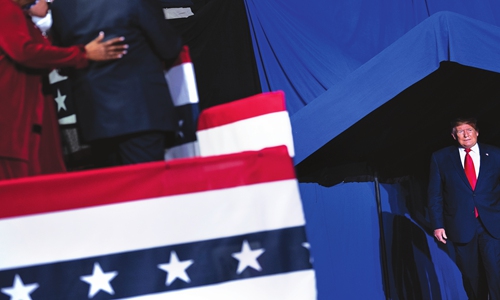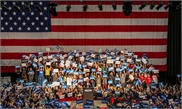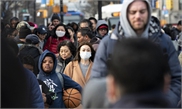
Photo: AFP
As the US presidential election is approaching, President Donald Trump is focusing more on his reelection. Hence, despite the rapid spread of the coronavirus disease (COVID-19), which has caused public panic in the US, Trump still continues downplaying the epidemic.Trump is increasingly concerned about his achievements as a president, particularly after the US stock market's recent meltdown. He doesn't want the US economy, which he has been flaunting, to be affected by COVID-19.
Trump cares more about his voters than general Americans. So, he wants to mitigate people's panic by downplaying the epidemic. In the meantime, top officials in his administration also have taken their shots in passing the buck to China and pretending that everything is going well.
US State Secretary Mike Pompeo groundlessly accused China of providing imperfect information, which put the US "behind the curve" in trying to contain the coronavirus outbreak. He also boasted his confidence in the US government's ability to appropriately respond to the coronavirus. "I'm confident that we'll handle it better than any nation in the world," Pompeo said in a CNBC interview.
On Saturday in a meeting with executives of Cruise Lines International Association in Florida, US Vice President Mike Pence highlighted the actions the Trump administration has taken, including suspending travel from China, saying the actions had won precise time for the US in epidemic prevention, Voice of America's Chinese site reported.
However, such rhetoric is losing its magic within the US. Many Americans and US media outlets are dissatisfied with their government's COVID-19 prevention. Criticism of the government's response to the virus has made headlines in the mainstream US media. Politico has bluntly said, "Trump's mismanagement helped fuel coronavirus crisis."
The difference in rhetoric between the government and media outlets reflects the flaws in the US governance.
Former US president Barack Obama once promised to improve health for all Americans, aiming at giving more adults access to healthcare coverage. But clearly the plan didn't work out well.
A coronavirus treatment could still be unaffordable for many Americans. According to a Business Insider report on February 29, coronavirus testing is free, but still a visit to hospital for suspected coronavirus treatment could cost a person up to more than $3,000. Such a bill would paint a dire picture for everyday Americans, not to mention the 27 million Americans without health insurance.
Given the recent campaign of Democratic candidates Bernie Sanders and Joe Biden, their approach to building a strong state and improving people's welfare has gained popularity for the Party.
The Republican Party traditionally represents high society, so even the Trump administration has approved an $8.3 billion emergency supplemental package, it is still worrying to know how the money would be properly used for epidemic prevention. The battle against the virus is not just about money, it is an issue of perception.
The Trump administration's perception of the situation has determined that the US would still focus on rivaling China although it is faced with the non-traditional security threat imposed by COVID-19. Due to narrow nationalism, the US was not considering lowering tariffs on goods from China in response to the fast-spreading coronavirus, it cares about carrying out phase one trade deal with China and simultaneously slanders China with COVID-19.
All these moves are in line with the US' strategy. Given such a mind-set, it is not surprising to see the US pass the buck to China and overlook the good opportunity to regain comprehensive cooperation with China by fighting the virus.
As the world's largest country with advanced economy, technology and healthcare, the US should have taken responsibility of a superpower by promoting international cooperation and uniting all countries in dealing with a common threat to all mankind. However, the reality is another story in which Washington doesn't even care about Europe, its close ally, that is suffering amid the COVID-19 outbreak.
The nature of the US political system does not serve its people but rather interest groups.
Therefore, US politicians won't view and deal with the COVID-19 epidemic from the perspective of global interests and long-term interests of people. Knowing this, we'll find US' irresponsibility unsurprising.
The article was compiled by Xu Hailin based on an interview with Wang Yiwei, a professor with the School of International Relations at Renmin University of China. opinion@globaltimes.com.cn


